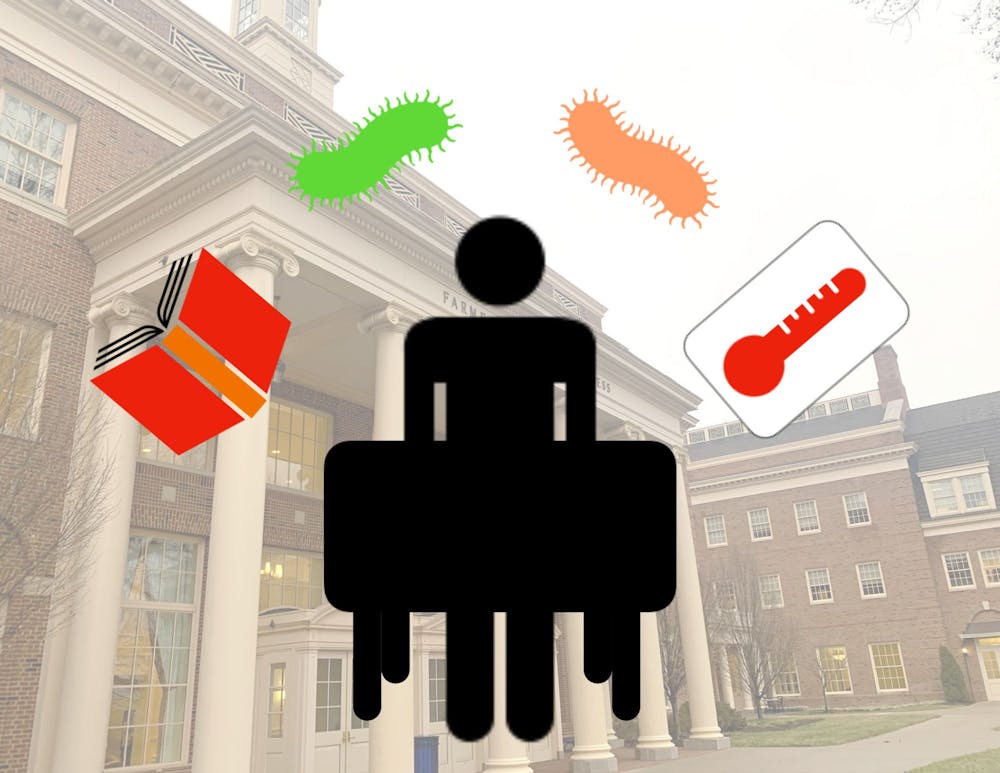The First Year Integrated Core (FYIC) is a program for first-year students in Miami University’s Farmer School of Business (FSB). The FYIC mandates four courses that include BUS 101, Foundations of Business and ESP 103, Creativity, Innovation and Entrepreneurial Thinking. First-years work through these courses and labs in group settings which end in a cumulative project at the end of the semester.
Classes in the FYIC program have a stringent attendance policy that allows just two unexcused absences in each class before students receive a 5% deduction from their overall class grade for each following absence.
This policy, while promoting consistent class attendance, does more to hurt students than it benefits them.
Many students are fully aware of the illnesses that accompany their first semester back at Miami. Oftentimes, stress from being in college for the first time can be a catalyst for first-year sicknesses. While sickness is generally an excused absence, professors often require notes or some type of proof that some sick students simply can’t provide. Regardless, this policy places an unreasonable level of restriction on students learning what college is like for the first time.
Students are given two days, maybe a couple more, from their professors to recuperate. But it isn’t uncommon that sickness can keep students out of class much longer than the two-class grace period.
I already know of two first-year students in the FYIC this year who have suffered from migraines and bronchitis — which hospitalized one of the students. Not to mention fevers, strep and severe colds have been running rampant amongst the Miami first-years.
Another prominent issue is mental health. It’s been proven that mental health issues among college students have been on the rise. A lot of college students have severe anxiety that prohibits them from participating or even going to class. Going hand-in-hand with that, they may face depression that makes it very difficult just to get out of bed, let alone attend classes.
These factors were clearly not calculated when the FYIC was crafted, and they absolutely need to be rethought.
Skipping class for any reason is stressful in itself. Missing class requires a student to attempt to find and learn missed material. Students must get notes from classmates and attend office hours that may or may not conflict with their schedules. However, this rigid attendance policy only adds additional stress when the student’s grade is being deducted.
My friend and first-year student, Jasmine Youngblood, is a student in the FYIC program at Farmer and has faced issues with the attendance policy. Jasmine has been sick many times throughout this semester, but she chose to push through and still attend class in fear of her grades dropping.
Not only did she go to class with a sore throat, runny nose and a bad cough, she pushed through even on her hardest days.
It may not be codified in the policy, but this is the expectation placed upon students in the FYIC. FSB students shouldn’t have to push through their illness, anxiety or depression just to continue with class.
Enjoy what you're reading?
Signup for our newsletter
Jasmine has shared with me that her anxiety can get in the way of many day-to-day activities — one of them being class itself. She says that it’s stressful when she simply can’t take a day off for her mental health. Jasmine feels that she and the other students in this program aren’t given a choice to prioritize their wellbeing.
Is it worth it for students to come to class, work in close quarters with their FYIC teams and spread their illnesses? We’re only a few years past the start of the COVID-19 pandemic, yet this policy feels decades old and unrefined.
Students can’t gain any new knowledge when they’re distracted by illnesses. That’s not worth the push many make just to be present in the classroom.
This policy may boost attendance, but a higher attendance rate doesn’t mean higher grades, participation or even understanding of the curriculum for the students.
First-year students deserve an experience that fosters growth and happiness, not a program that weeds out the new and curious students simply trying to get a handle on college in their first months at Miami.
Sasha Kapinos is a first-year psychology major with a minor in Spanish from Cleveland, Ohio. She is a contributor to the opinion section of The Student.




